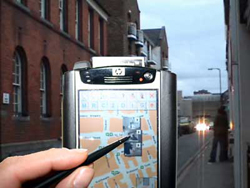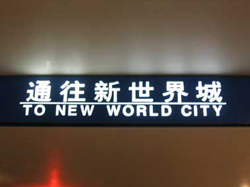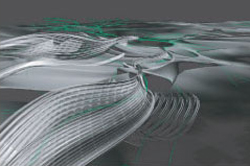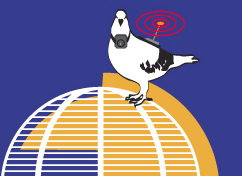ISEA2006 Symposium Papers + Panels
|
Absence in Common: An Operator for the Inoperative Community |
|
Written by Kuniko Vroman
|
|
Apr 13, 2006 at 09:48 PM |
absence, community, networks, memorials, communication, space, place Expanding on Jean-Luc Nancy's theory of the Inoperative Community, this paper will draw from recent memorial practices and communication theory to argue for the importance of absence in the construction of sound networks. Blindly celebrated by dystopian modernists, and blissfully ignored by utopian technophiles, the experience of absence is crucial to a nonviolent and just approach to communion. |
|
Last Updated ( Aug 07, 2006 at 12:58 AM )
|
|
Read more...
|
|
|
Aporias of the Digital Avant-Garde |
|
Written by Kuniko Vroman
|
|
Apr 14, 2006 at 02:38 PM |
digital, avant-garde, design, music video, commercial art, new media, convergence This paper maps two divergent trajectories within a narrowly defined sphere of short-form, time-based, digital media - specifically music videos, design-oriented short films and motion graphics - of the past ten years. I am particularly interested in considering this work's potential for understanding emergent relations to the perception and construction of space, time and bodies; the status of narrative; relations between technology and material culture; and shifting conceptions of the roles played by producers and consumers. |
|
Last Updated ( Aug 04, 2006 at 03:23 PM )
|
|
Read more...
|
|
|
Ars Memorativa in the Interactive City: Private Layers, Sublime Technologies in Public Spaces |
|
Written by Kuniko Vroman
|
|
Apr 18, 2006 at 08:40 PM |
public space, mobile, city, interactive, art of memory, interface, city, critical practice, tactics, participatory, engaging Location based media and in particular the so called locative arts discourse make claims for reconfiguring public spaces through participatory uses of mobile and wireless technologies in urban settings. In this paper I am questioning the degree to which location based media can challenge existing configurations of public space. Instead I suggest to "read" these acts, on the one hand as metaphoric or conceptual acts which address the discourse of public space, and on the other hand as private yet shared practices within public spaces, new forms of ars memorativa. In the paper I also consider the role of new technologies as a sublime. |
|
Last Updated ( Aug 04, 2006 at 03:40 PM )
|
|
Read more...
|
|
|
Art as Antibody: A Redefinition of Art for the Internet Age |
|
Written by Kuniko Vroman
|
|
Apr 18, 2006 at 09:54 PM |
art, immunology, research, genre, perversity, arrest, revelation, executability, recognition, perseverance Art's recent infiltration of stock markets, courtrooms, and mobile phones marks a seismic shift in the role it plays in society. The once-academic question "what is art" has acquired new urgency now that society depends on this collective immune system to confront technology's increasing encroachment into daily life. Drawing on case studies from our 2006 book At the Edge of Art, this paper examines the special powers granted art of the Internet age, which--no longer content to sit on a pedestal or auction block--can respond aggressively to the ethical crises caused by technology's infection of society. |
|
Last Updated ( Aug 04, 2006 at 03:37 PM )
|
|
Read more...
|
|
|
Chinese Archival Futures:Thinking Digitality Via Cornell's Wen and Goldsen Archives of New Media Art |
|
Written by Kuniko Vroman
|
|
Apr 18, 2006 at 09:43 PM |
Timothy Murray Chinese new media art, digitality, Archive Rose Goldsen, Archive of New Media Art Cornell University Cornell University's Rose Goldsen Archive of New Media Art and its specialized collection, The Wen Pulin Archive of Chinese Avant Garde Art, include an extensive array of new media art from China, Hong Kong, and Taiwan. As the Founding Curator, I have been struck by how these collections and the socio-cultural conditions of their production have expanded my sense of the mission of the Goldsen Archive as well as the cultural conditions and promises of digitality itself. |
|
Last Updated ( Aug 07, 2006 at 01:08 AM )
|
|
Read more...
|
|
|
Community Networked Tales: Stories and Place of a Dublin |
|
Written by Kuniko Vroman
|
|
Apr 14, 2006 at 04:04 PM |
 absence, community networks, memorials, communication, space, place absence, community networks, memorials, communication, space, place
This paper describes the content capture, design and implementation of the Media Portrait of the Liberties project. It focuses primarily on the results of a subjective user study conducted to gauge reactions to this novel media format. We close this paper by discussing the results of this study, and speculating on future directions for this work |
|
Last Updated ( Aug 04, 2006 at 03:44 PM )
|
|
Read more...
|
|
|
Device Art: A New Concept from Japan |
|
Written by Kuniko Vroman
|
|
Apr 23, 2006 at 12:54 AM |
media art, technology, science, material, gadget, entertainment, toy, commercialism, product, movement, history, cultureIn the international community of media art, Japanese media artists are often criticized for having positive attitude to technology rather than being critical. It is true that playfulness is often appreciated in Japanese media art, and there is no clear border between art and entertainment, or with popular culture. Why is that so? Is it wrong to appreciate technology? The paper discusses cultural and historical background of Japanese media art that leads to a proposal of Device Art, a new concept in media art. |
|
Last Updated ( Aug 04, 2006 at 03:38 PM )
|
|
Read more...
|
|
|
From Scenography to Planetary Network for Shanghai 2010 |
|
Written by Kuniko Vroman
|
|
Apr 18, 2006 at 09:30 PM |
|
Franck Ancel  World-Expo City World-Expo City
Shanghai is in the process of becoming the Asian New York, at the heart of the continent. It is this urbanisation process, emerging in a city with no end and no limits, that is being discussed for 2010. Consequently, what is being prepared at Shanghai is not simply an immaterial bridge between a universal-type event and a planetary dimension. Similarly, the theme of the contemporary city is coming increasingly to the fore in exhibitions dedicated to the electronic arts, as at the forthcoming international ISEA gathering, to be held at San Jose in 2006. Some of these planned interactions between urban evolution and current techno-scientific developments constitute the linkage between today's artistic mutations.
|
|
Last Updated ( Aug 07, 2006 at 01:05 AM )
|
|
Read more...
|
|
|
Indigenous Domain: Pilgrims, Permaculture & Perl |
|
Written by Kuniko Vroman
|
|
Apr 17, 2006 at 11:54 PM |
indigenous, commons, internet, property, belonging, colonize, stories, networks, webs of trust, cyberspace Indigenous Domain discusses the limitations of current colonial paradigms for cyberspace that try to rope off "commons" or "reservations" for the public good, but which still operate within a larger colonial framework. The paper proposes alternatives to the prevailing colonial paradigm of the "commons" and "copyleft" based on models drawn from indigenous culture, permaculture and digital culture. |
|
Last Updated ( Aug 07, 2006 at 01:02 AM )
|
|
Read more...
|
|
|
Organised Networks, Transdisciplinarity and New Institutional Forms |
|
Written by Kuniko Vroman
|
|
Apr 14, 2006 at 04:43 PM |
organised networks, distributive education, new institutional forms, collaborative transdisciplinary practices This paper describes and analyses the emergence of "organised networks" as new institutional forms. Organised networks, in contrast to "networked organisations" (universities, corporations, government, even contemporary art institutions), are distinct for the ways in which the organisation of social relations is immanent to the media of communication. The paper considers some of the ways in which organised networks facilitate the communication and production of educational resources across peer-to-peer, transdisciplinary social-technical networks.
|
|
Last Updated ( Aug 04, 2006 at 03:45 PM )
|
|
Read more...
|
|
|
The Participatory Challenge: Incentives for Online Collaboration |
|
Written by Kuniko Vroman
|
|
Apr 17, 2006 at 09:14 PM |
self-organized cultural projects, online collaboration, free cooperation, social software, mutual aid Current debates focus too much on what social tools can do and not enough on the people who use them. Motivations of the multitudes who add content to online environments matter a great deal. What follows here are hands-on guidelines and an outline of preconditions for online participation. Terms like: involvement, turn taking, network, feedback, or distributed creativity1 are frequently applied to characterise this kind of social and cultural interaction. |
|
Last Updated ( Aug 04, 2006 at 01:41 PM )
|
|
Read more...
|
|
|
Phylotic BodyScapes | Entheogenic Gardens: poly-scalar heterotopic |
|
Written by Kuniko Vroman
|
|
Apr 13, 2006 at 09:28 PM |
 intuitive programming, biomimetics, cultural mimetics, cyberbotany, hybrid reality, heterotopia, morphogenetic architecture, evolutionary fashion, design, phylotic multiverse continuum intuitive programming, biomimetics, cultural mimetics, cyberbotany, hybrid reality, heterotopia, morphogenetic architecture, evolutionary fashion, design, phylotic multiverse continuum
Phylotic is a computational system employing dynamically relational assemblages for analysis, synthesis and cataloguing of cultural and biological phenotypes into a library of seeds or DNA, which may be hybridized and grown upon infinite topographies In Phylotic, the human body becomes the most intimate heterotopic space, the breathing landscape onto which the computational system grows elaborate and sensuous bodyscapes/gardens |
|
Last Updated ( Aug 07, 2006 at 01:10 AM )
|
|
Read more...
|
|
|
Public Secrets: information and social knowledge |
|
Written by Kuniko Vroman
|
|
Apr 17, 2006 at 11:33 PM |
community, public domain, citizenship, information society, social justice, digital inclusion Secrets are the opposite of information. There are secrets that are kept from the public and then there are "public secrets" - secrets that the public chooses to keep safe from itself - like, "don't ask, don't tell." Such shared secrets sustain social and political institutions. The injustices of the war on drugs, the criminal justice system, and the Prison Industrial Complex are "public secrets". This paper will discuss the phenomenon of the "public secret" in the context information culture and present strategies for using information technologies to unmask such secrets. The presentation will reference an online audio database of statements by incarcerated women and injection drug users, which reveal the secret injustices of the war on drugs, the Criminal Justice System and the Prison Industrial Complex. |
|
Last Updated ( Aug 07, 2006 at 01:00 AM )
|
|
Read more...
|
|
|
Written by Kuniko Vroman
|
|
Apr 14, 2006 at 03:15 PM |
mapping, basemap, collaborative mapping, locative media Current collaborative mapping projects, using locative media technologies, have often overlooked the conventions of the basemap as a site for reinvention. Although these projects imagine alternative organizations of urban space through the way it is digitally mapped, they remain bounded by datasets that reinforce a Cartesian and static notion of urban space. This paper questions the methodology of the basemap, as it is utilized in these projects, and proposes alternative tactics for mapping the city. |
|
Last Updated ( Aug 07, 2006 at 01:04 AM )
|
|
Read more...
|
|
|
The Urbane Potential of Public Screens for Interaction |
|
Written by Kuniko Vroman
|
|
Apr 18, 2006 at 12:47 AM |
interactivity, digital displays, urban screens, public sphere, urban space, interactive facades, local culture, social sustainability, neighbourhood reactivation, urban communication www.urbanscreens.org investigates how the currently dominating commercial use of outdoor screens can be broadened with cultural content contributing to a lively urban society. Interactivity and participation will bind the screens more to the communal context of the space and therefore create local identity and engagement. The integration of current information technologies support the development of a new digital layer of the city in a merge of material and immaterial space redefining the function of this growing infrastructure. |
|
Last Updated ( Aug 07, 2006 at 01:03 AM )
|
|
Read more...
|
|
|
Towards New Class of Being - The Extended Body |
|
Written by Kuniko Vroman
|
|
Apr 18, 2006 at 10:10 PM |
art and science, art and biology, new species, extended body, semi-living, partial life, tissue culture, tissue engineering The biomass of disassociated living cells and tissues is in the thousands of tons. These fragments do not fall under current biological or cultural classifications. The notion of the extended body can be seen as a way to define this category of life, while at the same time attempting to destabilise some of the rooted perceptions of classification of living beings. The extend body can and is an amalgamation of the human extended phenotype with tissue life - a unfiled body for disembodied living fragments, an ontological device, set to draw attention to the need of re-examining current taxonomies and hierarchical perceptions of life. |
|
Last Updated ( Aug 07, 2006 at 01:09 AM )
|
|
Read more...
|
|
|
Written by Kuniko Vroman
|
|
Apr 19, 2006 at 08:29 PM |
language, voice, song, body, code, music, social, authorship, folk data The relationship between code and language, cultures, and machine has started being analyzed quite profoundly the past few years, yet how does code relate to human voice? Code is an interesting mixture of human and machine languages, of social and mathematical communication. With the work of Florian Cramer as an inspiration and big influence I would like to speculate wildly about how code not only reflects a changing attitude in the transcription and creation of meaning, but also on how this in turn reverberates in the use of our human voice, specifically in the arts. |
|
Last Updated ( Aug 04, 2006 at 04:00 PM )
|
|
Read more...
|
|
|
|
